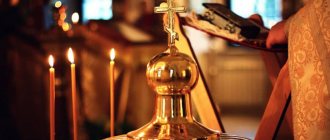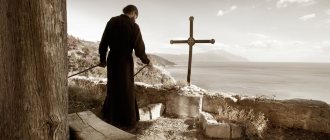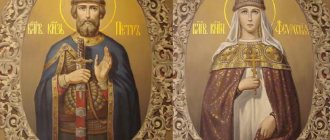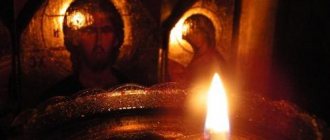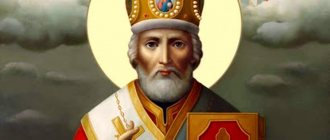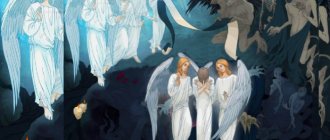Egyptian saint
For other uses, see Pachomius (disambiguation).
| Saint Abba Pachomius the Great | |
| Father of Spiritual Community Monastic Life | |
| Founder | |
| Born | 292 AD Thebes, Egypt |
| Died | (348-05-09)May 9 348 Egypt |
| Revered in | Roman Catholic Church Coptic Orthodox Church Eastern Orthodox Church Eastern Catholic Churches Eastern Orthodox Churches Lutheran Church |
| Main shrine | Monastery of Saint Pachomius (Luxor), Egypt |
| Holiday | 9 May 14 Pushon (Coptic Orthodox) Roman Catholic Benedictines and Eastern Orthodox celebrate his feast day on 15 May. |
| Attributes | Hermit in clothes, Hermit crossing the Nile on the back of a crocodile |
Pachomius
(/пəˈkoʊмяəs/; Greek: Παχώμιος; Coptic: Ⲡⲁϧⲱⲙ; c. 292 – 9 May 348 AD), also known as
Pachome
,
Pachomios
, and
Pakhom
, is generally recognized as the founder of Christian communal monasticism.[1] The Coptic Church celebrates his feast day on May 9, and the Eastern Orthodox and Roman Catholic churches celebrate his feast day on May 15[2] or May 28.[3] into the Lutheran Church, he is remembered as a renovator of the church along with his contemporary (and other desert saint), Anthony of Egypt on January 17.
Life
Pachomius was born in 292 Thebes (Luxor, Egypt) to pagan parents.[4] According to his hagiography, at the age of 21, Pachomius was forced against his will into recruitment into the Roman army, a common occurrence during this period of unrest and civil war. Together with several other young men, he was put on a ship that sailed down the Nile and arrived in Thebes in the evening.[5] Here he first met local Christians, who usually brought food and comfort to the military personnel daily. This made a lasting impression, and Pachomius vowed to continue his study of Christianity when he left. He was able to leave the army without even fighting, and was converted and baptized (314).
Pachomius then came into contact with several well-known ascetics and decided to follow this path under the guidance of a hermit named Palaemon (317). One of his rituals, popular at the time, was to pray with his arms outstretched in the form of a cross.[5] After studying for seven years with Palamon, Pachomius decided to live the life of a hermit near St. Anthony of Egypt, whose practices he imitated, until Pachomius heard a voice in Tabennisi that told him to build a dwelling for hermits.[6] An earlier ascetic named Macarius created a series of proto-monasteries called lauras, or cells, where holy men who were physically or mentally unable to achieve the rigors of Anthony's solitary life would live in community settings.
Pachomius founded his first monastery between 318 and 323 in Tabennisi, Egypt.[7] His older brother John joined him, and soon there were more than 100 monks living nearby. Pachomius set about organizing these cells into a formal organization. In the meantime, Christian asceticism was lonely or a hermit
with male or female monks living in separate huts or caves and meeting only for periodic worship.
Pachomius created a community or hostel
organization in which male or female monks lived together and owned their common property under the leadership of an abbot or abbess. Pachomius realized that some people, familiar only with hermit life, might quickly become disgusted if the distracting cares of public life were too suddenly imposed on them. Therefore, he allowed them to devote all their time to spiritual exercises, taking upon themselves all the administrative tasks of the community. The community proclaimed Pachomius "Abba" ("father" in Hebrew), from which "abbot" is derived. The monastery at Tabennisi, although enlarged several times, soon became too small, and a second one was founded at Pabau (Fau).[6] After 336, Pachomius spent most of his time in Pabau. Although Pachomius sometimes acted as a lecturer for nearby shepherds, neither he nor any of his monks became priests. Saint Athanasius visited and wanted to ordain him in 333, but Pachomius fled from him. Athanasius's visit was probably the result of a zealous defense of Orthodoxy against Pachomius. Arianism.[5]Basilius of Caesarea visited and then adopted many of Pachomius's ideas, which he adapted and implemented in Caesarea. This ascetic rule, or Ascetica, is still used by the Eastern Orthodox Church, comparable to the Rule of St. Benedict in the West.
Venerable Pachomius the Great. Life
The Monk Pachomius was born around 295 in Upper Egypt, in Thebaid, in the vicinity of the city of Esne. His parents were pagans. Pachomius, according to the custom of those places, went to school at an early age, where, in addition to basic knowledge, moral rules were also taught, so the inclinations of a chaste life were reflected in Pachomius very early. One day a woman began to persuade a young man to sin with her. Pachomius sternly answered her: “I cannot commit such a bad act; Are my eyes the eyes of a dog, that I should sin with my sister?” and immediately left. Subsequently, he himself told the monks about this incident, urging them to carefully provide for temptations and temptations.
When Pachomius was 20 years old, he was taken into the army. During one of the stops, certain people appeared at their resting place and began to treat everyone with various dishes. When Pachomius asked why these people cared so much about them, without knowing them at all, he was told that these were Christians, and that they were doing this for the sake of God. This had a strong effect on Pachomius, and he took a vow of allegiance to Christ.
After his military service, Saint Pachomius went to the secluded village of Shenesit (Khinovosk), where he received holy baptism and lived for a long time nearby, in the then empty temple of Serapis. Pachomius earned his livelihood by cultivating vegetables and several palm trees, whose fruits he gave to those who came here and to the local poor. Pachomius here excelled in love for his neighbor. When a contagious disease began to rage in the village, Pachomius lovingly served the sick. Even at this time, Pachomius’s piety and prudence attracted many to him for permanent residence. However, after three years, he began to feel burdened by the crowds and began to look for a leader in spiritual endeavors, for he encountered church disagreements. With tears, he prayed to God to reveal to him where the truth was, and one day during such a prayer he heard a voice that the truth was kept in the Church ruled by Alexander, Bishop of Alexandria. Then Pachomius left his home, asking one monk to cultivate vegetables and palm trees here for the sake of the poor.
He decided to become a student of the ascetic Palamon, known for his strict lifestyle, unsustainable for many. Seeing Pachomius’ determination, Abba Palamon accepted him. After a three-month trial and intense prayers, the elder clothed Pachomius in monastic robes and began to teach him to stay awake at night in prayer, as well as to strictly fast, not even allowing him to eat butter on Easter, but only bread and salt sprinkled with ash. Pachomius often retired among the mountains and spent entire days and nights in prayer, raising his hands to the sky and not allowing himself to lower them.
One day Pachomius walked through the desert. Finally, he reached the ruins of the village of Tavennisi, a little south of Shenesit, and here he heard a voice: “Pachomius, Pachomius, strive and abide in this place; build yourself a monastery, and many people will come to you to become monks around you, and they will benefit their souls.” Pachomius informed Abba Palamon about this. Both went to Tavennisi and built a cell. The elder predicted here the nearness of his death and the glory of the future Pachomius Monastery. After a long prayer they parted, and Abba Palamon returned back. Soon he became dangerously ill, and Pachomius, coming to him, looked after his elder until his death.
Then he returned to Tavennisi, grieving for the deceased mentor, with whom he labored for 10 years, and in his solitude he devoted himself to intense labors. One day his elder brother, John, came to him. Pachomius' conversation had a strong effect on him, and he remained in Tavennisi forever. They led a very strict life. Dressed in rough clothes, they stood in prayer until the morning, without bending either their knees or their arms extended to the sky, and if they were overcome by sleep, they sat down in the same place where they performed their prayer, but did not allow themselves to lean on anything . Throughout the day, the ascetics engaged in physical labor until the heat from the scorching rays of the southern sun became unbearable. The brothers loved each other more and more and humbled themselves before each other, but John became more and more successful in his deeds of piety and self-mortification. Having soon reached high spiritual perfection, he died, mourned by Pachomius.
Saint Pachomius at this time was already a true ascetic. Therefore, he had very strong temptations, but with his prayer and patience he always managed to repel the terrible machinations of the enemy: the visions he evoked, the thoughts of vanity, pride, lust, and bizarre insurances inspired by him. The fight against the dark forces of hell required Pachomius to exert all his strength. At this time, the Lord sent him a new comforter - in the person of the experienced monk Apollo (or Hierocapallon), but soon he too departed to the Lord.
One day, when Pachomius was collecting reeds for his needlework, an Angel of the Lord appeared to him and announced: “Pachomius, Pachomius, Pachomius! It is God’s will that you serve the human race and reunite people with God.” When the Angel left, Pachomius, looking after him, said: “This is the work of the Lord.”
Soon after the appearance of the Angel, three lovers of God came to the Monk Pachomius to strive: Pshentaisi, Surus and Pishoi. Convinced of their sincere piety, Pachomius accepted them and clothed them in monastic clothes, and they zealously devoted themselves to exploits, guided by the example and instructions of Saint Pachomius. They were amazed by his hard work in serving his neighbors. In turn, freeing the new monks from all external worries, Pachomius inspired them to diligently engage in activities that directly lead to the purification of the heart, to strengthening the will for good. Uniformity in food and clothing was considered necessary in this small hostel.
The rumor about Saint Pachomius spread more and more throughout Egypt. Other seekers of asceticism began to come to him. Sometimes hermits also came, having already achieved high spiritual perfection, to place themselves under the guidance of Saint Pachomius: Abba Pechosh (or Pecusius), Abba Cornelius, Abba Paul, Abba Pachomius and Abba John. Pachomius received them all with joy. Many people aspired to the monastery, but with great reasoning he selected only those who, after testing, showed themselves fit for monasticism.
Soon Saint Pachomius built a church in the village, in which he diligently performed the duties of a reader, and a presbyter was invited there to celebrate the Eucharist. But the number of monks in the Tavennisi community increased more and more, and when it reached one hundred people, Pachomius built a church in the monastery.
Among the monks of the Pachomiev Monastery, no one had the rank of presbyter. And Pachomius himself did not want to accept this rank. He often said to the brethren: “It is good for us not to ask for such a thing, so that there is no envy, no dispute, no disobedience, no division among the monks, contrary to the will of God. Like a fire on a threshing floor, if they had not hastened to extinguish it, it would have destroyed the work of a whole year: the same thing is represented by the thought of pride in its beginning.”
The following incident from his life is known. One day Saint Athanasius the Great was surveying his flock. Bishops, presbyters and people came out to meet him. Abba Pachomius also came out with his monks, singing psalms. At this time, Serapion, Bishop of Tentira said to the saint: “I ask your love to make Abba Pachomius, the father of monks, a priest, so that he will rule over all the monks of my district.” Hearing this, Saint Pachomius immediately disappeared. Saint Athanasius said a prayer and said to the Pachomiev disciples: “Greet your father and tell him: you hid from me and avoided what could arouse envy and competition; you have chosen virtue, which will remain forever with Christ. May our Lord reward you according to your desire.”
The Monk Pachomius was both a teacher, a judge, and a model for the monks. He constantly urged the monks not to weaken in prayer, and took advantage of every opportunity to say a word of edification to one brother or another. The monks gathered every evening for spiritual conversation and generally loved to edify each other with the lessons that each one learned from reading the word of God and from observing the lives of certain people. There were no idle conversations or gossip in Tavennisi.
Some monks were so strict with themselves that they ate food only once every two days. However, the post, according to the original charter, was not imposed on anyone against their will. Saint Pachomius persuaded only the monks closest to him to completely abstain from food on Wednesdays and Fridays. All those who passed one or another obedience in the monastery, especially the leaders, were very zealous and reluctantly agreed to the rest allowed by the great abbot. They were convinced that this world is a place of no rest, hard work, constant struggle and selfless deeds. Every monk was required to submit completely to his superior and unconditionally comply with the rules. This was the main difference between the life of a monk and the life of a hermit. Complete obedience was also the key to the spiritual improvement of the Cenobites.
When the number of monks in Tavennisi increased more and more, the various duties in the monastery also multiplied. The monks, with their labor, prepared everything necessary for the monastery, and only a little they had to buy in the cities. The money was kept, according to the commandment of Saint Pachomius, in one place, at the disposal of the steward. Monks could not have their own money. Among the monks there were many who came to the monastery as children with their parents. Even later they did not know how to distinguish between gold and silver and were completely indifferent to money.
The non-covetousness of the brethren was so great that everyone had only one garment and one coverlet made of sheep or goat skin.
Several people always went on a journey together, trying to remain silent. In secular homes, monks usually did not eat food. No one in the monastery could tell what he saw or heard in the world unless it led to general edification. Wanderers were received in a special room, and only the gatekeepers announced the arrival of one of the relatives.
Saint Pachomius even refused to allow his sister Mary a visit. He sent monks to build her a dwelling on the other side of the Nile. Soon she became the founder and elder of the monastery there. Abba Pachomius also took care of this monastery with great zeal. He also drew up the rules of monastic life for him. The number of sisters in the women's dormitory soon multiplied to four hundred.
When the monastery became crowded, then, by the inspiration of God, Saint Pachomius found another place convenient for the monastery. It was called Pevoe. Here a new monastery was built, very extensive and soon became the center of the entire community. This monastery was surrounded by a fence, and a church was built in it. Pachomius moved many monks from the old monastery to the new one, especially those who were well accustomed to the rules of community life and could be experienced leaders and serve as a good example for the new brethren. Some time passed, and the two monasteries could no longer accommodate everyone who wanted to work here. Gradually, seven more monasteries were established. The number of monks in the Tavennisi hostel reached 7 thousand people. And all this multitude of monks, scattered across many monasteries, was a single monastic brotherhood. Saint Pachomius often visited all monasteries. He himself began to live in the Pevou monastery, where the general administration of all monasteries was concentrated. During his travels to review the monasteries, Saint Pachomius taught the monks not only by word, but also by example. He was ready to obey anyone, humbled himself before inferiors and accepted lessons even from the youngest member of the hostel.
For a long time, only Copts labored in the Tabennisi hostel, but then the Greeks and Romans came here. In the matter of caring for the Greeks, the Monk Pachomius was assisted by Theodore, a former reader of the Alexandrian Church. But Saint Pachomius himself took care to learn the Greek language.
Pachomius' humility was great, although he performed extraordinary feats. Saint Pachomius was afraid to condemn others even in his thoughts. Having repeatedly received visions and revelations from God, he spoke about them to the brethren when he expected benefit for the brethren from his story.
One day the brethren asked him to tell one of his visions. Saint Pachomius said: “He who is full of sins will not receive the grace of spiritual visions. But if you want to have a sublime vision, then I will point you to one of them. When you see a pious, humble-hearted, pure man - this is the most beautiful of visions, for then you see the invisible God in this visible man. Don’t ask for another vision that would be preferable to this one.”
Extremely non-covetous, Pachomius wore a very poor dress. It also served as a blanket for him in cold weather. In this robe he received priests and monks who came to him. During his illness, he did not agree to cover himself with the best blanket instead of matting and take a handful of dates, and also taste food with butter.
Pachomius treated sick monks with special love. Most of all, he cared about saving the soul of his sick brother. He urged the patient to thank God and look cheerfully at his future, placing his trust in the Lord. He was ready to give the patient every consolation for the sake of love for his neighbor. So, he allowed one seriously ill person to taste beef, saying to the indignant brethren: “Don’t you see that this brother is almost dead? Why didn't you give him what he asked of you? After all, there is a difference between diseases, and one disease can be more severe than another.”
For his high virtues, the Lord rewarded Saint Pachomius with the gifts of clairvoyance and miracles. One day there was a shortage of wheat in the monastery. Pachomius spent the whole night in fervent prayer. The next morning the chief of one city came with supplies of grain. He said that he had made a vow to give bread to the needy, and that that night he learned in a dream that it was the brethren of this monastery who had such a need.
Saint Pachomius was afraid that the monks might become addicted to something earthly. He was even afraid that the beauty of the temple would not entertain the monks. Saint Pachomius zealously warned his disciples against vanity, and advised them not to stand out from the brethren in appearance. He urged people to perform exploits in secret, for the sake of God, and not for the sake of human praise.
Pachomius convinced one monk, who spent many nights in continuous prayerful vigil, enjoying the hope of earning respect from people, to change this way of life and do everything for the sake of God, not giving the devil a place in his heart. But the monk did it his own way, while scolding the elder, and was truly put to shame by the devil when his hands were paralyzed. Only then was he cured of his madness and stubborn pride.
Another brother managed to weave two mats a day and expected praise from Abba Pachomius. Seeing his state of mind, Pachomius said to his interlocutors: “Don’t you see this unfortunate brother? He lost this day's work because he loved the glory of men more than the glory of God; he tired himself and deprived his soul of all success and profit.” Pachomius ordered his brother to bring these mats when the brethren gathered in the church, and ask the monks for forgiveness and prayers. He had to do the same in the meal during lunch. To further heal his soul, Pachomius ordered him to sit hopelessly in his cell, prepare two mats every day instead of one, eat only bread and salt, not talk to anyone except one brother who would bring him bread, and earnestly ask God forgiveness for your sin.
One day Saint Pachomius had to go into a monastery where the monks were infected with heretical views. Here the monks told the Pachomius disciples that their leader was inviting Pachomius to cross the river together to show which of them was right, who was more pleasing to God. Pachomius told them sternly: “My labors and concerns are not aimed at crossing the river as a pedestrian, but at avoiding the punishments of God and crossing that fiery river, through which we all, people, must cross before the throne of our Lord Jesus Christ. Moreover, the Gospel says: Do not tempt the Lord your God.” Saint Pachomius saw in the proposals of the heretics the machinations of Satan, who wanted by a miraculous appearance to shake the faith of the monks and arouse vanity in them.
The Monk Pachomius did not want the monks to indulge in strict exploits out of compulsion, and not out of their own desire. So, he ordered to burn the mats that the brothers had made not with a blessing, but willfully, out of excessive zeal. But at the same time, Saint Pachomius took advantage of every opportunity to arouse in them zeal for exploits, for crying over sins, for spiritual progress. Once, while walking with his student Theodore near the tombs, Pachomius saw several women crying inconsolably. He said to Theodore: “Look at these women, how bitterly they shed tears for the dead whom they cannot resurrect. Moreover, we, who are called monks, should not weep for our souls, dead because of sin, and which Christ will resurrect according to His love for mankind!”
The Monk Pachomius and his monks cared not only about their own salvation and well-being, but also about the salvation and well-being of their neighbors. Thus, one day the Monk Pachomius was told that there was a great famine in Egypt, which was also accompanied by a pestilence. And all the time, when the famine continued in Egypt, Pachomius was in great sorrow, indulged in the strictest fasting and prayed for an end to the national disaster. He also prayed that the Lord would help the monks fulfill their high vows; and for those laity who are still enslaved to sin or darkened by heresy; and for kings, so that they live in love with God and do justice to the offended; and for the shepherds, so that the Lord would help them to be faithful successors of the apostles. Many people were converted to good life under the influence of his holy life and prayers.
Saint Pachomius, with God's assistance, provided people with miraculous help in their bodily ailments. A certain presbyter Dionysius brought a bleeding woman to the gates of the monastery, who had not received help from anyone and now received healing by touching the hem of Saint Pachomius’s robe. He healed, through anointing with oil, his daughter brought by one man, and told her father that she did not live in virgin purity and commanded her through her father to be chaste. Many demoniacs received healing from the monk.
But one day Saint Pachomius was praying for a man possessed by an unclean spirit, and a voice came to him from above to stop his prayer, since this misfortune befell the man for his own spiritual benefit. Although the Lord performed many healings through the hand of Pachomius, the great Abba always considered it higher and more necessary to heal the soul from serving idols, from lies, from fornication and impurity of all kinds, in general from all sin.
Great were the fruits of the activity of Saint Pachomius. The monks under his leadership achieved high perfection. Thus, the gardener Jonah spent 85 years in monastic labors and especially in non-covetousness and strict fasting. All the trees in the garden were planted by him, but he never ate their fruit. His dress was the most beggarly, something like a leather blanket that barely covered his body. He did not think at all about bodily peace. Working all day in the garden under the scorching rays of the sun, Jonah only stopped this hard work in the evening and went to his cell, where until midnight he twisted ropes, glorifying God with his lips and heart. Then only for a short time he fell asleep and soon got up to devote himself to prayer. He died sitting on his chair, the ropes remained in his hands. He was buried in the same form as he died, wearing only a woolen shroud.
In the Pachomius hostel there was one monk, stricken with leprosy, named Athenodorus. This monk showed a rare example of patience, complacency and hard work during a constant, cruel illness. Like all the monks of the hostel, he wove matting every day, although his hands, damaged by leprosy, were stained with blood from work. His compassionate brother advised him to at least rub his hands with oil. Athenodorus followed this advice, but Pachomius remarked with fraternal reproach that he should not place his hope in oil, but surrender himself entirely to the will of God, since it was not without the Providence of God that this illness befell him. Athenodorus pleaded guilty and asked Pachomius for forgiveness. He mourned this sin for a whole year afterwards. The monks of the Pachomius hostel were so strict with themselves.
The Lord also revealed the future destinies of monasticism to Saint Pachomius. One day, many brothers with Pachomius went to cut cane. When the boat was already loaded with reeds, Pachomius saw something very terrible. He imagined that some of the monks were in the mouths of lions, others in the mouths of crocodiles, others in the midst of fire, and some under a mountain on which waves were pressing: they tried to climb the mountain, but all their efforts were in vain and they exclaimed: “Lord, help us!" Seeing this, Pachomius threw the reed he was carrying on his shoulders to the ground, extended his hands to the sky and began to pray very loudly, asking the Lord for help for these unfortunate people. All the monks also began to pray. The prayer continued until the evening. It was revealed to Pachomius that this vision refers to a time when he will no longer be alive.
In the last years of his life, Saint Pachomius had another vision regarding the fate of monasticism. One day, shutting himself up in his cell, Pachomius was praying. Suddenly a bright light illuminated his room and a voice was heard: “The generation that will follow you will lead a life pleasing to God, as in these days.” Then it was revealed to him how widely the monasteries would spread.
But then he saw a very deep and gloomy ditch, in which countless monks walked, bumping into each other. Some made terrible efforts to get out of this ditch, rose to half the depth, but then fell headlong. Many cried pitifully for compassion. Some finally managed to reach the highest point of this abyss; They then gave great praise to God. Having come to his senses, Pachomius realized that in this vision the future state of the souls of monks who behaved badly was revealed to him. Pachomius cried out to God with great sorrow, asking His mercy for the monasteries and monks. He almost despaired for them. In response to his cries to God, he heard a voice: “Pachomius, do not forget that you are a man: everything depends on My mercy.”
Prostrate on the ground, Pachomius prayed to God for mercy towards him. Then he was consoled by the appearance of Christ the Savior Himself in the form of a young man, of indescribable beauty, with a crown of thorns on his head. Christ revealed to him that his disciples would look at him as a lamp from which they could borrow light for themselves. Their behavior will be in accordance with the rules. Their inner mood will be good. Subsequent monks will imitate them. But the time will come when faith will weaken and vices will intensify. Neglect and addiction to sensual goods will distinguish the monks of that time. Spiritual darkness will increase. They will fight with each other for the possession of worldly goods. There will be very few true ascetics. They will not have leaders. They will have to motivate themselves to do good and avoid evil. Of course, their exploits will have little value compared to the exploits of the first monks. However, they will receive the same reward as the first, because they will have to suffer from difficult living conditions.
Pachomius was very glad when all this was revealed to him. He remained without food for many days. The next day, the abba offered a touching conversation to the monks gathered in the church. Real life, he said, passes quickly, and death approaches us and can suddenly befall us when we are not at all ready. Therefore, a person must always diligently fulfill the commandments of God, not leaving a single one unattended. The thought of the bliss of the righteous and the torment of sinners constantly accompany us. We cannot help but think about the perishability of man, about the fact that real life does not contain anything of which one could be proud and to which one could have an addiction. At the same time, Saint Pachomius warned the monks that it was they, who had renounced the world, who would be most pitiful if they began to act contrary to their duty and instead of God serve the devil and sin.
Greatly weakened by his exploits, the Monk Pachomius suffered a serious illness, from which many monks had already died. Saint Theodore served him with filial love. The heat was extraordinary, and the old man did not eat for a long time. He became so weak that even the blanket weighed him down. However, he continued to talk with the brethren. Pachomius spent forty days in the hospital. Having taught many useful instructions during this time, Pachomius the Great died at the age of 53 (most likely in 348). Theodore's hand covered the eyes of his beloved Abba. The brothers kissed the holy body with tears. They read prayers for his repose all day and all night. In the morning the Bloodless Sacrifice was made for him. Then the brethren, singing, carried the body of Pachomius to the mountain and buried it according to custom. Returning to the monastery, the brethren said to each other with great sorrow: “Truly, today we are orphans.”
Board of St. Pachomia
Pachomius was the first to establish a written rule.[8] The first rule consisted of well-known and widely used prayers such as the Lord's Prayer. The monks had to pray to them every day. As the community developed, rules were developed based on commandments taken from the Bible. He drew up a rule that made life easier for the less experienced, but did not limit extreme asceticism for the more experienced.[6] The rule sought to balance prayer with work, social life with solitude. The day was organized around liturgy, with time devoted to manual work and devotional reading.
Fasting and work were distributed according to the strength of the person. Each monk received the same food and clothing.[9] Common food was provided, but those who wished to leave were encouraged to do so, and bread, salt and water were placed in their cells. In the Pachomian monasteries, each monk determined his way of life at the discretion of each. Thus, the hours of meals and the duration of his fast were determined only by himself, he could eat with others or have bread and salt in his own cell every day or every other day.[7]
His rule was translated into Latin by Jerome. Honoratus of Lerins followed the rule of St. Pachomia. Basil the Great and Benedict of Nursia adapted and incorporated parts of it into their rules.[10]
Death and legacy
Painting of Pachomius the Great in Curtea Veche, Bucharest.
Pachomius remained abbot of the Cenobites for about forty years. During an epidemic (probably the plague), Pachomius called the monks, strengthened their faith and appointed his successor. Pachomius died 14 pushons, 64 APPEAR. (9 May 348 AD).
By the time Pachomius died, eight monasteries and several hundred monks followed his leadership.[7] Within a generation, coenobic practices spread from Egypt to Palestine and the Judean Desert, Syria, North Africa and eventually Western Europe.[11] The number of monks, rather than the number of monasteries, could reach 7,000.[12][13]
His reputation as a holy man endured. As mentioned above, several liturgical calendars are dedicated to the memory of Pachomius. Among the many miracles attributed to Pachomius is that, although he never learned Greek or Latin, he sometimes miraculously spoke them.[5] Pachomius is also credited with being the first Christian to use and recommend the use of a prayer rope.
Prayers
Troparion, tone 8
From your tears you cultivated the barren desert, / and those who sighed from the depths with a hundred labors bore fruit, / and you were the lamp of the universe, shining miracles, / Pachomie from What is ours,/ pray to Christ God// for our souls to be saved.
Kontakion, tone 2
The lamp of light appeared at the end, / you created the desert cities with multitudes of monastics, / you crucified yourself, your cross was carried on the frame, / and you exhausted your body with abstinence ́//praying unceasingly for all of us.
Recommendations
- Gawdat Gabra; Hani N. Takla (2010). Christianity and Monasticism in Upper Egypt
. American University in Cairo Press. paragraph 33. ISBN 978-977-416-311-1. - (in Greek) Ὁ Ὅσιος Παχώμιος ὁ Μέγας. ΜΕΓΑΣ ΣΥΝΑΞΑΡΙΣΤΗΣ.
- (in Russian) May 15/28. Orthodox calendar.. Pravoslavie.ru
- "Saint Pachomius the Great." www.fatheralexander.org
. Retrieved March 17, 2022. - ^ a b c d
"Saint Pachomius".
www.ewtn.com
. Retrieved March 17, 2022. - ^ a b c
Francis Joseph Bacchus.
"Saint Pachomius". www.newadvent.org
. Catholic Encyclopedia. Retrieved March 17, 2022. - ^ a b c
Gilbert Huddleston.
"Monasticism". www.newadvent.org
. Catholic Encyclopedia. Retrieved March 17, 2022. - “Saint Pachomius”, Vera N.D.
- "Reverend Pachomius the Great, Founder of the Community of Monasticism", Orthodox Church in America
- Duffy, Patrick. "Saint Pachomius (292-346) founder of a community for monks", Catholic Ireland
, May 5, 2012 - Kenneth W. Harl (2001), The World of Byzantium
, ISBN 1-56585-090-4 (Audio recording) - Peter Brown (Norton, 1971), The World of Late Antiquity: 150–750.
, p.99 - Philip Rousseau (University of California Press, Berkeley, 1985), Pachomius: The Making of Community in Fourth-Century Egypt
, pp.74–75 ISBN 0-52005048-7 - Crum, Walter Ewing (1939). Coptic Dictionary
. Oxford: Clarendon Press. paragraph 25.

